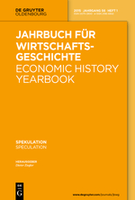
Jahrbuch Fur Wirtschaftsgeschichte
Scope & Guideline
Fostering Scholarly Dialogue on Economic Evolution
Introduction
Aims and Scopes
- Industrial History and Knowledge Transfer:
The journal consistently explores the historical development of industries, particularly brewing and banking, and examines how knowledge and technologies were transferred across regions and cultures. - Globalization and Economic Networks:
A core focus is on the globalization of industries, analyzing how businesses adapted and expanded internationally, including the influence of marketing and technology. - Cultural Influences on Economic Practices:
The journal examines how cultural factors shaped economic behaviors and practices, particularly in the context of specific industries like brewing. - Historical Analysis of Financial Systems:
There is a strong emphasis on the evolution of financial systems and banking practices, particularly in relation to international lending and economic crises. - Interdisciplinary Historical Research:
The journal promotes an interdisciplinary approach, merging economic history with insights from sociology, cultural studies, and technology studies.
Trending and Emerging
- Internationalization of Industries:
There is a growing emphasis on the internationalization of industries, particularly in brewing and banking, showcasing how companies navigate global markets and cultural exchanges. - Technological Advancements and Their Impact:
Research increasingly highlights the role of technological advancements in shaping industries, especially in the context of knowledge transfer and industrial development. - Cultural and Social Dimensions of Economics:
Emerging studies focus on the interplay between cultural/social factors and economic practices, particularly how advertising and consumer culture influence industries like brewing. - Environmental and Resource Economics:
Recent publications indicate a rising interest in environmental impacts and resource management within historical contexts, particularly regarding agricultural practices and industrialization. - Digital History and Data Analysis:
The integration of digital methodologies and big data analysis into historical research is gaining traction, reflecting a broader trend in the field of historical studies.
Declining or Waning
- Pre-20th Century Agricultural Economics:
Research focusing on agricultural practices and economic models before the 20th century has decreased, possibly as scholars shift towards modern economic structures and their historical implications. - Local Economic Practices:
Studies centered on localized economic behaviors and practices seem to be waning, as the journal increasingly emphasizes broader, global economic networks and their historical contexts. - Traditional Banking Structures:
There is a noticeable decline in discussions surrounding traditional banking structures and practices, as contemporary themes of globalization and international banking take precedence. - State Finances and Conflicts from Earlier Eras:
While state finances remain a topic of interest, the focus on earlier historical conflicts related to taxation and state finances has diminished in favor of more current economic debates.
Similar Journals

Asia-Pacific Economic History Review
Fostering Interdisciplinary Dialogue on Economic HistoriesAsia-Pacific Economic History Review is a distinguished journal published by WILEY, focusing on the rich and dynamic intersection of economic and historical perspectives within the Asia-Pacific region. With the ISSN 2832-157X, this peer-reviewed journal stands out for its commitment to open access, ensuring that groundbreaking research is readily available to academics and practitioners alike. As a newly established platform from 2023 to 2024, it has rapidly garnered attention, earning a Q1 classification in History and Q3 in Economics and Econometrics for 2023, reflecting its dual significance in both fields. The journal's ranking within the Scopus database showcases its rising impact, particularly within the top percentile for Arts and Humanities in History. Scholars are encouraged to contribute to this high-quality, interdisciplinary forum that explores the economic histories of the Asia-Pacific region, providing valuable insights and fostering discourse among researchers, professionals, and students passionate about this vital area of study.
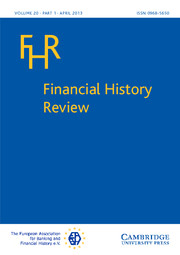
Financial History Review
Decoding Financial Evolution for Today's ScholarsFinancial History Review, published by Cambridge University Press, stands as a pivotal journal in the field of financial history, reflecting its significance by achieving a distinguished Q1 classification in History and a commendable Q3 classification in Finance as of 2023. With its ISSN 0968-5650 and E-ISSN 1474-0052, the journal offers a rich repository of scholarship that integrates economic theory with historical analysis, appealing to a diverse audience of researchers, professionals, and students. Since its inception, the journal has provided insightful discourse on the evolution of financial systems, the impact of economic policies, and the lessons history can impart on contemporary financial practices. Although it is not an open-access journal, its well-researched articles and rigorous peer-review process ensure high scholarly standards, making it a valuable resource for those seeking to understand the interplay between finance and history. The Financial History Review, headquartered in Cambridge, England, continues to foster academic dialogue and enrich the field, contributing significantly to both historical scholarship and financial studies.

Cliometrica
Bridging History and Economics with Rigorous ResearchCliometrica, published by Springer Heidelberg, is a prestigious journal that has made significant contributions to the fields of Economics and Econometrics as well as History. With an impressive 2023 Scopus ranking placing it in the Q2 category for Economics and Econometrics and the Q1 category for History, this journal stands out as an essential resource for researchers, professionals, and students alike. Known for its rigorous scholarly approach, Cliometrica merges quantitative and qualitative methodologies to uncover insights into historical economic analysis, reflecting the interdisciplinary nature of contemporary research. With access strictly through subscription, it continues to uphold high academic standards, making it a vital addition to any academic library. Published in Germany, Cliometrica serves as a key platform for advancing the discussion and understanding of historical econometric techniques, ensuring its relevance and importance in both historical and economic research circles.
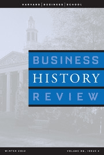
BUSINESS HISTORY REVIEW
Charting the Evolution of Business Through Time.Business History Review is a prestigious academic journal published by Cambridge University Press that has been at the forefront of historical scholarship in business since its inception in 1926. With a strong emphasis on interdisciplinary research, it covers a wide range of topics within the field of business history, making it an essential resource for researchers, professionals, and students interested in understanding the historical contexts that shape contemporary business practices. The journal is recognized for its high scholarly impact, featuring a Q1 ranking in History and Q2 rankings in both Business and International Management and Business, Management and Accounting (miscellaneous) categories. Although not an open-access publication, it offers significant insights and groundbreaking research for its audience. With a commitment to promoting a deeper understanding of business's past, Business History Review remains a vital publication for those seeking to connect historical analysis with modern business challenges.

Iberian Journal of the History of Economic Thought
Charting the Course of Economic Thought in IberiaThe Iberian Journal of the History of Economic Thought, published by Ediciones Complutense, serves as a pivotal platform for the dissemination of scholarly research related to the history of economic ideas in the Iberian context. With its Open Access model established since 2014, this journal aims to enhance visibility and accessibility of research findings, making valuable contributions to the field for researchers, professionals, and students alike. Although currently lacking a quantified impact factor, the journal's dedication to rigorous academic standards ensures that it continues to attract high-quality submissions that reflect contemporary discussions in economic thought. Located in the vibrant academic hub of Madrid, Spain, the journal seeks to explore the rich tapestry of economic theories and practices that have emerged across the Iberian Peninsula, offering a crucial resource for those interested in the historical development of economic concepts and their relevance today. Whether you are seeking to publish your research or delve into the rich archives of past economic theories, the Iberian Journal of the History of Economic Thought stands out as an essential resource in the evolving landscape of economic scholarship.
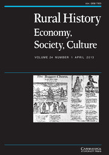
Rural History-Economy Society Culture
Connecting Past and Present: The Essence of Rural Histories.Rural History: Economy Society Culture is a vital academic journal dedicated to exploring the multifaceted aspects of rural history from economic, societal, and cultural perspectives. Published by Cambridge University Press, this journal contributes substantially to the field by presenting innovative research that spans a range of disciplines, including history, geography, and urban studies. With a convergence of scholarship from 1990 through 2024, this journal holds significant rankings in the top quartiles of its categories, particularly excelling in History where it ranks in the Q2 quartile. It also demonstrates respectable positions in other arts and humanities domains, reflecting its considerable impact, especially in history-related studies, where it sits in the 76th percentile. While not open access, it provides valuable insights for researchers, professionals, and students passionate about understanding the dynamics of rural societies and their historical underpinnings. For scholars aiming to contribute to this rich dialogue, Rural History serves as an essential platform for disseminating significant findings and advancing knowledge in the field.

Cuadernos de Historia Moderna
Fostering Open Dialogues in Historical ResearchCuadernos de Historia Moderna is a prominent academic journal dedicated to the field of modern history, published by UNIV COMPLUTENSE MADRID, SERVICIO PUBLICACIONES. With its commitment to Open Access since 1988, this journal ensures that cutting-edge research is freely accessible, fostering scholarly engagement and collaboration among researchers, professionals, and students alike. Operating from Madrid, Spain, Cuadernos de Historia Moderna is characterized by its interdisciplinary approach, attracting contributions that explore various aspects of modern history, from cultural shifts to socio-political developments. Although positioned in the Q4 quartile within the Arts and Humanities History category (ranked #1329/1760), it remains an important platform for emerging scholars and established professionals looking to disseminate their research on contemporary historical issues. With continued growth in its reach and visibility, this journal is poised to play a crucial role in shaping historical discourse for years to come.
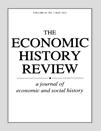
ECONOMIC HISTORY REVIEW
Illuminating the Economic Forces that Shaped Our World.Economic History Review, published by Wiley, stands as a premier journal in the realms of Economics and Econometrics and History, established in 1927 and converging its reach through 2024. With an impressive impact factor reflected in its tier placements—Q1 in both Economics and History categories as of 2023—this journal provides critical insights and comprehensive analyses that advance understanding of economic historical developments. It is recognized in the Scopus Rankings with notable standings in the Arts and Humanities (Rank #25/1760) and Economics (Rank #259/716), placing it in the top percentiles in these fields. Although not an open access journal, it offers various subscription options, ensuring a broad dissemination of valuable research. The Economic History Review appeals to a diverse audience including researchers, professionals, and students eager to explore the intricate relationships between economic phenomena and historical contexts.
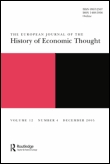
European Journal of the History of Economic Thought
Unraveling the Historical Tapestry of Economic TheoryThe European Journal of the History of Economic Thought, published by Routledge Journals, Taylor & Francis Ltd, stands as a pivotal platform for scholars in the interdisciplinary fields of economics, history, and philosophy. With its ISSN 0967-2567 and E-ISSN 1469-5936, this esteemed journal is not only recognized for its Q2 ranking in various categories, including Arts and Humanities and Economics, but it also boasts an impressive HIndex indicating a significant level of academic influence and engagement. With published works spanning from 1993 to 2024, this journal seeks to illuminate the historical context and evolution of economic thought, promoting critical discourse among researchers, professionals, and students alike. Although it does not currently offer open access, the journal remains a crucial resource for those wishing to delve into the intricate relationships between economic theory and historical progression. By fostering a deeper understanding of economic ideas and their implications, the European Journal of the History of Economic Thought plays a vital role in enhancing the scholarship within its domain.
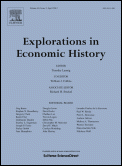
EXPLORATIONS IN ECONOMIC HISTORY
Unearthing the Past, Shaping the FutureExplorations in Economic History, published by Academic Press Inc Elsevier Science, is a prestigious journal that has significantly contributed to the fields of Economics and History since its inception in 1969. With its ISSN 0014-4983 and E-ISSN 1090-2457, this journal has maintained a solid reputation, underscored by its impressive ranking in the Q1 quartile for both Economics and Econometrics and History as of 2023. It serves as an essential platform for researchers, professionals, and students who are keen on unveiling the economic dimensions of historical events and contexts. The journal is indexed in Scopus, attaining a ranking of 61 out of 1760 in Arts and Humanities (History) and 354 out of 716 in Economics, reflecting its significant impact in the academic community. Despite not being an open-access journal, its critical analyses and comprehensive studies provide invaluable insights into the economic phenomena of the past, fostering a deeper understanding of contemporary economic challenges. With committed publication until 2024, this journal continues to be a vital resource for those striving to explore the intricate intersections of history and economics.